Intel Core i7-10700 vs Core i7-10700K Review: Is 65W Comet Lake an Option?
by Dr. Ian Cutress on January 21, 2021 10:30 AM EST- Posted in
- CPUs
- Intel
- Core i7
- Z490
- 10th Gen Core
- Comet Lake
- i7-10700K
- i7-10700
CPU Tests: Legacy and Web
In order to gather data to compare with older benchmarks, we are still keeping a number of tests under our ‘legacy’ section. This includes all the former major versions of CineBench (R15, R11.5, R10) as well as x264 HD 3.0 and the first very naïve version of 3DPM v2.1. We won’t be transferring the data over from the old testing into Bench, otherwise it would be populated with 200 CPUs with only one data point, so it will fill up as we test more CPUs like the others.
The other section here is our web tests.
Web Tests: Kraken, Octane, and Speedometer
Benchmarking using web tools is always a bit difficult. Browsers change almost daily, and the way the web is used changes even quicker. While there is some scope for advanced computational based benchmarks, most users care about responsiveness, which requires a strong back-end to work quickly to provide on the front-end. The benchmarks we chose for our web tests are essentially industry standards – at least once upon a time.
It should be noted that for each test, the browser is closed and re-opened a new with a fresh cache. We use a fixed Chromium version for our tests with the update capabilities removed to ensure consistency.
Mozilla Kraken 1.1
Kraken is a 2010 benchmark from Mozilla and does a series of JavaScript tests. These tests are a little more involved than previous tests, looking at artificial intelligence, audio manipulation, image manipulation, json parsing, and cryptographic functions. The benchmark starts with an initial download of data for the audio and imaging, and then runs through 10 times giving a timed result.
We loop through the 10-run test four times (so that’s a total of 40 runs), and average the four end-results. The result is given as time to complete the test, and we’re reaching a slow asymptotic limit with regards the highest IPC processors.

Google Octane 2.0
Our second test is also JavaScript based, but uses a lot more variation of newer JS techniques, such as object-oriented programming, kernel simulation, object creation/destruction, garbage collection, array manipulations, compiler latency and code execution.
Octane was developed after the discontinuation of other tests, with the goal of being more web-like than previous tests. It has been a popular benchmark, making it an obvious target for optimizations in the JavaScript engines. Ultimately it was retired in early 2017 due to this, although it is still widely used as a tool to determine general CPU performance in a number of web tasks.
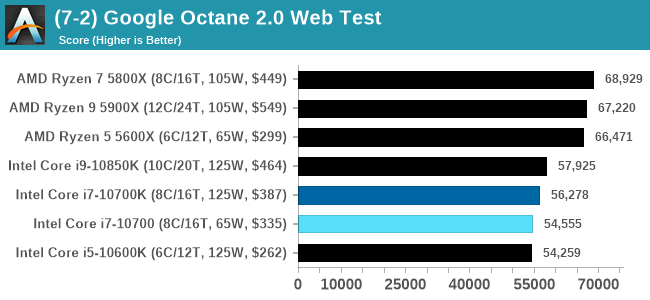
Speedometer 2: JavaScript Frameworks
Our newest web test is Speedometer 2, which is a test over a series of JavaScript frameworks to do three simple things: built a list, enable each item in the list, and remove the list. All the frameworks implement the same visual cues, but obviously apply them from different coding angles.
Our test goes through the list of frameworks, and produces a final score indicative of ‘rpm’, one of the benchmarks internal metrics.
We repeat over the benchmark for a dozen loops, taking the average of the last five.
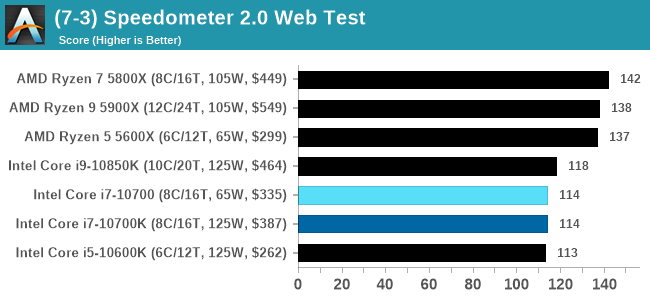
Legacy Tests
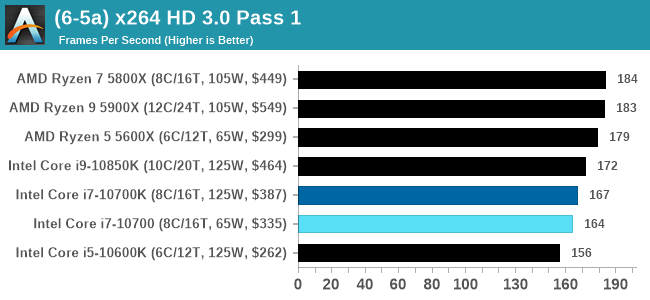
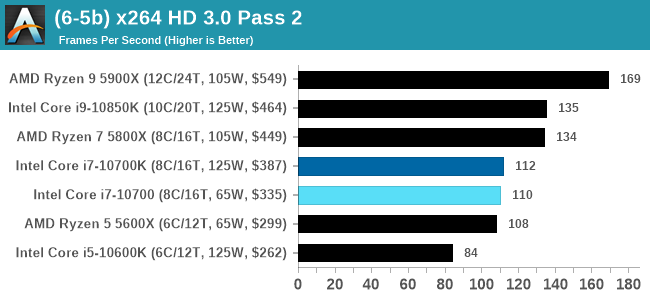
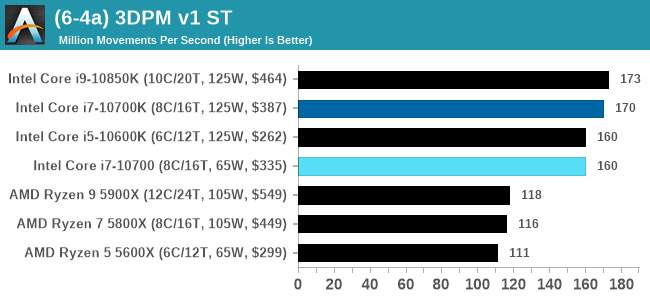
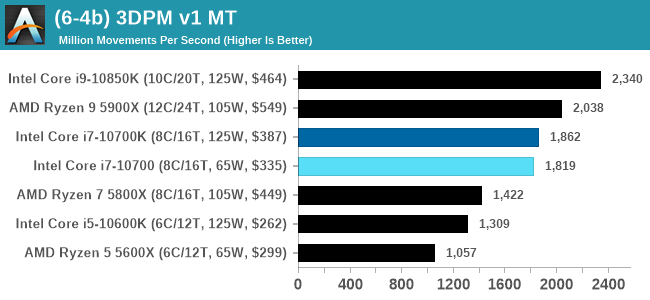
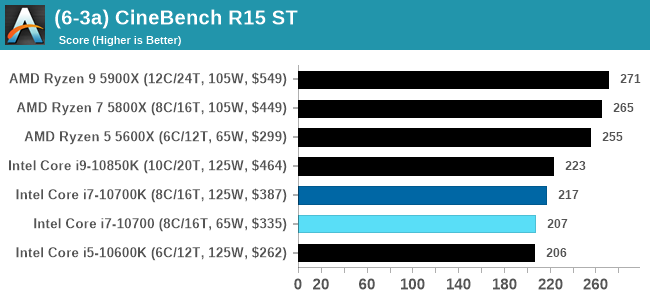
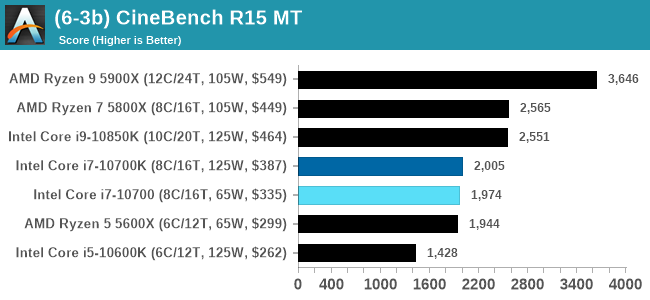


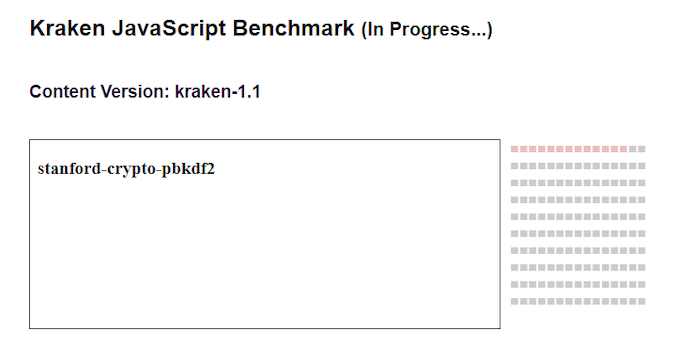
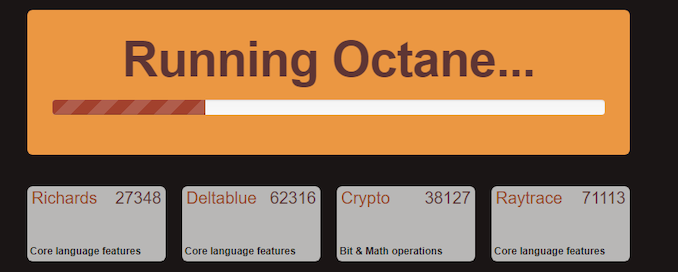
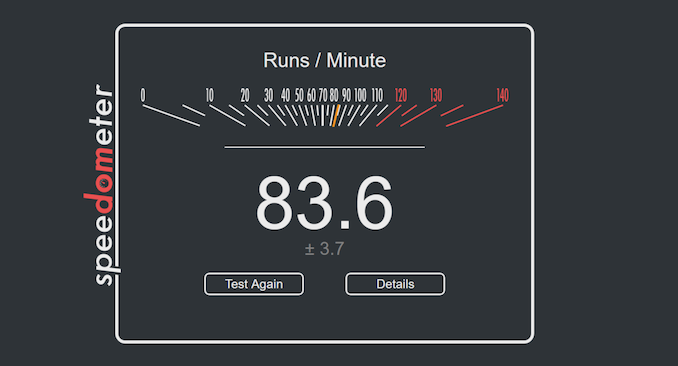








210 Comments
View All Comments
Oxford Guy - Monday, January 25, 2021 - link
'What if I don't agree about the location of the "sweet spot" based on RAM prices local to me, or my own performance needs?'Price vs. performance is a different topic. Nice attempt to change the subject, though.
Spunjji - Wednesday, January 27, 2021 - link
It's not at all an attempt to change the subject. The point is that the issue of an "optimal" RAM speed is a moving target dependent on multiple variables.Makste - Saturday, January 23, 2021 - link
As a part of his audience, I am actually satisfied with this review, as I am looking for the out of the box experience. I'm most likely not to tamper with the manufacturer's recommendations. So he tested the CPUs following both Intel and AMD recommendations. Something I don't see a problem with.Oxford Guy - Sunday, January 24, 2021 - link
Turning on XMP is hardly tampering, particularly since motherboard vendors provide lists of recommended RAM to use those XMP profiles with.theqnology - Monday, January 25, 2021 - link
If it shouldn't be the case, shouldn't consumers take it up with Intel, and not with the reviewer? Why does Intel put lower max than the current JEDEC standards (e.g., Intel at 2933 while AMD at 3200)? I ask, if Intel was so confident about their products, why not up the official support?This is really the crux of it. Intel wants to make it part of the difference between their Z boards and their non-Z boards, which adds more cost for the consumers, while at the same time washing themselves from this responsibility should something not work (you cannot RMA based on non-JEDEC compatibility). It is also fascinating that consumers think this is on the reviewers.
Oxford Guy - Monday, January 25, 2021 - link
Sure, as long as the reviewer is consistent with the logic.That means no reviewing boards that violate the official base clock and turbo behavior.
Things like that.
Spunjji - Wednesday, January 27, 2021 - link
Then he can't review any board at all.Honestly, this "everything must be treated exactly the same otherwise nothing is fair" rhetoric is ghastly and corrosive in whatever domain it's applied.
Qasar - Thursday, January 28, 2021 - link
" That means no reviewing boards that violate the official base clock and turbo behavior. "considering that intel doesnt make board makers conform to anything as far as what " default " would be, good luck with this.
quiq - Sunday, January 24, 2021 - link
i want to view the 1070 whit stock box and a h410/470 motherboard thats the real user for a non k cpuvs 10700k and z490 aftermarket HeatSink or WC Oc memories etc Real entusiast cpu
IanCutress - Saturday, January 23, 2021 - link
Please go ahead and enforce both Intel and AMD to rate their memory controllers faster then. Its not opinion, it's the literal standard,and the only way to ensure consistency for comparisons across generations. I'm not going to offer one CPU a higher dram overclock than another, that isn't fair, just in the same way I'm not going to overclocked the cores. I regularly dive into AT's audience metrics, and have done for years. If you want data that's different, then please by all means either do your own testing or find other reviews. But you know, also get them to deep dive into microarchitecture as well as get all the behind the curtain info. Also, all our content is free at the point of use. By your logic, I'm also a consumer of content at AT, thus I also pay my salary. Please enjoy.